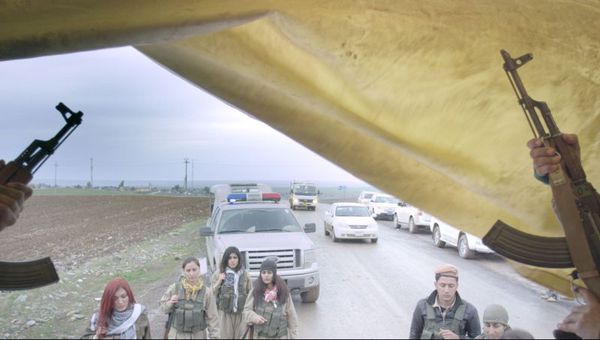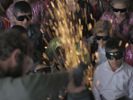Eye For Film >> Movies >> A Flag Without A Country (2015) Film Review
A Flag Without A Country
Reviewed by: Amber Wilkinson

Bahman Gobadi follows his heart with his filmmaking, frequently blending documentary and fiction, whether it is casting non-actors in fiction features such as A Time For Drunken Horses or getting documentary subjects to play 'versions' of themselves, as in No One Knows About Persian Cats or here as he examines two people who are helping Kurdish children in a Syrian refugee camp in northern Iraq.
Perhaps because the two protagonists' stories are told separately and then woven through editing the film doesn't quite come together, developing a stilted oddness that is never resolved and leaving the suspicion that a straightforward documentary would have been altogether more successful, particularly given that the refugee camp footage is so strong.

This is not to take away from the film's two main subjects - Nariman Anwar and Helly Luv. Anwar, in particular, has led a fascinating life. A keen pilot, he became famous for landing a plane on a road in order to deliver a speech during the 2013 Kurdistan election campaign but a freak crash as he took off again left him alive but injured and he is seen on crutches for much of the film. He wants to teach children how to fly - a metaphor Gobadi loves - and when parents in the Iraqi Kurdistan capital of Erbil are, not surprisingly, a bit worried about trusting him with the lives of their children, he heads to the refugee camp to continue his recruitment.
Pop star Helly Luv is also recruiting at the camp - looking for cute kids to star alongside lions, among other things, in her latest pop video. Soon, however, she is visiting on a regular basis, helping them learn to sing. Above all of this hovers the threat of the Islamic State - with the historical repetition of violence and displacement emphasised by details from Luv and Anwar's recollections of childhood as we consider the current crop of child refugees. Unfortunately, this, too, is unbalanced and skewed towards Anwar, while the children never really become anything more than a collection of potential - opportunities to give them a voice as individuals are missed. Everything here is sincerely meant but Gobadi struggles to make the stories fit together in any meaningful way, with the scripting paradoxically too loose for most of the film and then suddenly far too on the nose. You ultimately have to wonder whether, if this film had been made by a less well known director, it would have received the festival play it has.
Reviewed on: 04 Jun 2016















